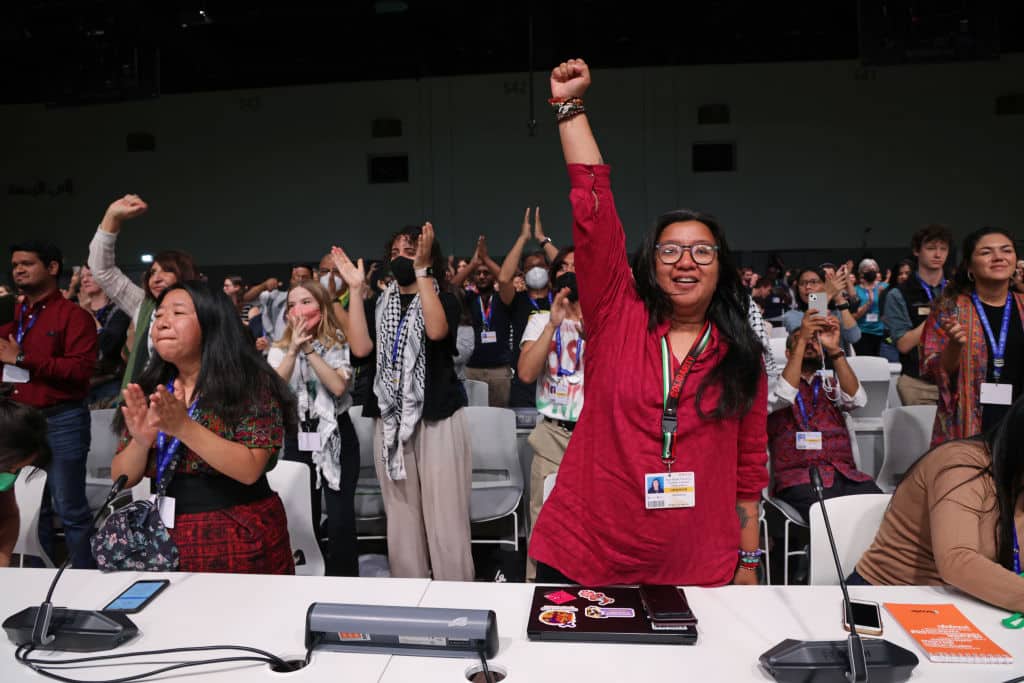When Kate Kallot turned on her microphone and boldly asserted that artificial intelligence (AI) for climate action should not be confined to the Global North, the room began to shift. Hers was a demonstration of a new form of activism and actionism deeply rooted in the ownership of homegrown solutions, as exemplified by her organization, Amini Corp. With a description of Amini’s mandate to fill data gaps in Africa and incorporate indigenous practices into that data — projecting to enhance cocoa sustainability in Ghana and crop yields in South Africa — Kallot’s speech received a standing ovation. An unapologetic advocate for the emergence of Africa’s women and youth, I chose to interpret this roar of applause as a signal of the broader acceptance that indeed Africa’s time has come to adjust its seating position from the back of the room to the center of the global decision-making table. Kallot, an exemplar of Africa leveraging innovation to take ownership of its challenges, represented the constituency of African women and youth whose mission to redefine the continent’s narrative on self-help, self-empowerment, and self-elevation was both seen and felt at the COP28 conference in Dubai.
To establish why it was crucial to see and hear Africa’s women and youth in action at COP28, it’s imperative to establish the stark reality driving their presence. Africa grapples with a perilous triple threat: the relentless impact of climate change, heightened vulnerability, and a distressing lack of preparedness — an uncomfortable truth we must confront. In 2023 alone, devastating floods wreaked havoc in the Libyan port city of Derna, an earthquake struck Morocco, wildfires swept across Algeria, and Cyclone Freddy triggered landslides in Malawi – the epicenter of the disaster – killing thousands. Simultaneously, severe floods caused chaos in the Democratic Republic of the Congo and Rwanda.
The escalating drought conditions in the Horn of Africa pushed parts of Somalia to the brink of famine, leaving more than 23 million people across the region facing severe hunger, according to the United Nations World Food Programme. As if that wasn’t devastating enough, when the long-awaited rains arrived in Somalia, they were so intense that livestock, homes, and farmlands were washed away, while schools and health facilities were forced to close their doors. Why is this so distressing? Because countries like Somalia, contributing only 0.03% of total global emissions, are disproportionately affected by climate change. The most vulnerable, especially women and children, bear the brunt of these disasters.
While moderating the High-Level Event on Artificial Intelligence for Climate Action, hosted by the UNFCCC Technology Mechanism in collaboration with the COP28 UAE Presidency, I observed Africa’s proactive efforts in developing customized approaches to climate action. Instances such as Senegal’s 2020-2025 strategy, which strives for “digital for all” to bridge digital divides, especially for populations most vulnerable to climate change, and GIZ’s project in Kenya using AI for forest protection and crop yield predictions, showcased the continent’s commitment to innovation.
As these advancements unfolded on one side of the expansive COP28 landscape, other Africa-focused initiatives, including the African Women Clean Cooking Support Programme (AWCCSP) initiated by the President of the United Republic of Tanzania, Samia Suluhu Hassan, and Kenya’s African Women Studies Centre (AWSC) dedicated to integrating women into climate action as part of Kenya’s journey to Gender-responsive climate justice, highlighted the importance of women leading interventions that directly impact their livelihoods.
Perhaps even more exciting was the presence of youth leaders like Ugandan climate change advocate, Vanessa Nakate and Ghanaian Climate Reality Leader, Maxwell Beganim, whose audacious emphasis on the urgent need for sustainable action and their impassioned calls for climate justice reverberated throughout COP28, ensuring that the voices of Africa’s youth were not only heard but profoundly felt in shaping the collective discourse on climate change and its impact on the continent’s future.
My celebration of Africa’s women and youth at COP28 does not exist in isolation. It represents the growing hope for an intersectionality between Africa’s stark reality on climate change, the continent’s burgeoning surge of solution-providing innovations for climate action, and the collective efforts aimed at addressing and mitigating the profound challenges that the continent faces.
